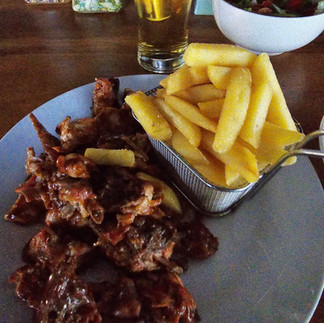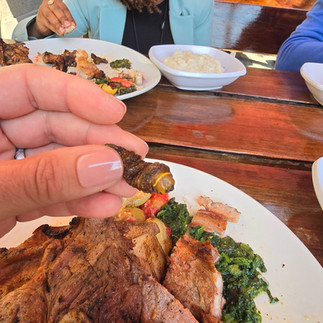Life in Zambia
- heyheynicolep
- Jun 23, 2024
- 6 min read
It's been 2 months now since I arrived in Zambia. Before coming here I didn't even know where Zambia was on the map of Africa. Zambia is in the southern half of Africa, bordered by 8 other countries: Malawi, Tanzania, Democratic Republic of Congo, Angola, Namibia, Zimbabwe, Botswana, and Mozambique. Think about the US for a minute - we have 2 borders with other countries.

I live in a hotel across from a shopping mall, which creates a bit of a bubble, not exactly immersed in Zambian life. I am living and working in the capital city of Lusaka, home to over 3 million people. For context, my home town of Durham, NC, has a population of 300,000. Seattle has a population of 3.5 million. Lusaka is a major city, although it doesn't actually feel like it. There are few tall buildings, 6 foot walls surround almost every property, both residential and commercial, and the only form of public transportation are vans with more people crammed inside them than there are seats.
WEATHER
It is early winter here. The mornings are cool with temperatures in the low 50s, but most afternoons it warms up to the 70s and sometimes 80s. There is almost always strong winds whipping through the city. As I type I can hear it blowing outside my hotel, rattling something metal nearby that I've never been able to identify. It's the kind of wind that makes a beautiful sunny day seem like a day where maybe you should just stay indoors. When I do go for walks around the city I am usually in short sleeves and I see Zambians walking past me in winter coats, hats, and scarves. They stare at me like they are wondering what this crazy white woman is doing in summer clothes. A taxi driver told me recently that Zambians die of hypothermia in the winters here. I would find that really difficult to believe if I didn't witness the local population dressed as if it was mid-winter in Wyoming.
BRITISH INFLUENCE
Zambia was a British colony until 1964. I see the British influence everywhere, in the names of restaurants (Scallywags is a favorite of mine), in the way they say the letter Z (Zed), and in the military time keeping (2pm is 14:00). There is a Polo field near my hotel and the British High Commission had a huge celebration of the King's Birthday, attended by very high level Zambians. And french fries are called chips.
FOOD
There is a fast food chain here called Hungry Lion that's in every mall and every town across the country. It's as popular and prevalent here as McDonald's is in the US. They exclusively sell fried chicken and chips, and it's pretty good.
I've actually had to make an intentional effort to eat traditional Zambian food. It's been easier to find western influenced food or Indian cuisine than it's been to find Zambian food. A coworker recently took me to a popular Zambian eatery where I ordered the pork chop. I watched as the cook pulled the largest pork shop I've ever seen off the huge smoking grill and took a butcher's knife to it in a startlingly violent process and swept it onto a plate for me, along with some sides I was totally unfamiliar with. Some kind of local eggplant that wasn't eggplant and something green like kale but not kale, with nshima on the side. Nshima is a staple in Zambia. It's hard to describe as an American because we don't have anything quite like it. It's made from finely ground corn meal, commonly called mealie meal, and served as a doughy ball. I sat down with my plate of chopped pork and mystery vegetables and dish of nshima and waited to watch how my coworkers ate. No forks, no spoons, no cutlery of any kind was in sight. Zambian food is eaten with your hands - you pull off some nshima and roll it in your hand to form a small ball, then use it to scoop up your meal. It's a surprisingly awkward way to eat when you've been told not to eat with your hands your whole life.
My coworker shared a bowl of mopane worms with me. Yes, they are worms. Small, roasted worms that are harvested from trees. I'm willing to try most things, and I can say a mopane worm mostly takes like overly grilled tiny crunchy chicken. Not bad, but not something I wanted to eat a bowl of.
TRANSPORTATION
Each weekday morning I am picked up by US Embassy motor pool, along with several others at other locations. On a day when everyone is in the office there are 6 of us at 3 different locations and it takes anywhere from 15-30 minutes to get to work. There is always traffic in Lusaka. Always. But there are very few stop lights. I can actually only think of 1 on our route. That's not to say there aren't very busy intersections. There are some 2-lane roundabouts which are a sort of every-person-for-themselves kind of system. But mostly intersections are controlled chaos of inching your car forward far enough until the crossing traffic has no choice but to stop and let you proceed. Sometimes there are traffic police, but that actually slows the whole process down.
The most popular taxi service here is called Yango. It's similar to Lyft and Uber only in that it's has a mobile app. Almost every time I use it the driver calls and ask where I am and where I am going, despite putting those details into the ride request. And the only way to pay is with Kwacha, the Zambian currency. Pretty much everywhere I've taken a taxi to in Lusaka has been less than K100 - the equivalent of less than $3.
THE THINGS AMERICANS TAKE FOR GRANTED
Power. Power is something we have in the US every single day unless there's some weather emergency. We expect to wake up each day with power. We expect to come home from work each day with power. Not here. Many African countries experience "load shedding", which is essentially the power being shut off for 12+ hours at a time. When I first arrived in Zambia there was a relatively organized schedule for load shedding - neighborhoods knew what time the power would be shut down and when it would come back on. But since I've been here it's become irregular and more frequent. Power is out almost every day from morning to evening, only coming on at midnight and then going out again at 5am. In the US we have warnings about storms coming and we diligently charge all our electronics and make sure we don't open the fridge while the power is out. Here people arrive home after work, cook in the dark, and are woken in the middle of every night when the power suddenly comes on and lights and alarms come to life.
Clean water. In the US we drink, wash our dishes, shower and brush our teeth without wondering if the water is safe. Here I use boiled water to fill ice cubes. I drink bottled water despite how much single use plastic it creates. I don't order drinks with ice in restaurants. I'm lucky to be in a modern hotel where the water is cleaner, but I still take precautions.
Amazon. Need some random thing you've just now thought of? Order it on Amazon and it's at your doorstep the next day. I don't even know how daily mail works here in Zambia. If there's something you can't find in the stores here you can order it online but don't expect to receive it for a month or more. Want aluminum-free deodorant? Tough. Looking for quality toilet paper? Better order from the US. On a dairy-free diet? You're out of luck. Need something basic from CVS or Target like Tums or Pepto Bismol? Find the little pharmacy in the mall and try to explain what it is you need and hope they have something relatively similar that's effective.
Washing Clothes. At home when it's time to wash my clothes I just toss them in the washer, then the dryer, and my clothes are clean and ready to wear again within 2 hours. Not in Zambia. I don't know why, by the shortest cycle I've found on the washing machines is 1 hour and 5 minutes. And there are no dryers. None. Anywhere. Everything you wash is line dried - bedding, towels, socks, underwear. Everything. Do your laundry on a Tuesday and take it off the line on Wednesday after work and you'll probably still need to iron it.
But the best part of living in Zambia has been the Zambians. They are kind and welcoming and seem genuinely pleased when I try to use their local language, even if I get it wrong. I was recently in the eastern part of the country out for a walk in the late afternoon. The wind was blowing my long dark hair and school children on the street would smile at me and say, "WOW! Look at her hair!". As I was walking in my short sleeves shirt passing Zambians dressed for winter they would stop me and say "Are you enjoying our weather?". There is community here, and I feel welcomed into it. I am grateful everyday that I get to be here and experience life in Zambia.


























































Comments